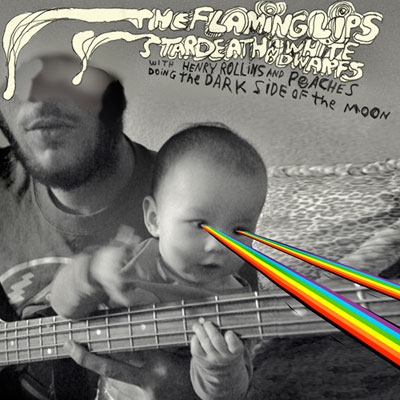
***
Shortly after releasing its long-rumored Christmas on Mars film and completing the expansive, two-disc Embryonic, The Flaming Lips returned to the studio to cut yet another album. But instead of focusing on its own songs or even a mix of covers, the Oklahoma-bred band decided to record a new version of Pink Floyd’s Dark Side of the Moon. A collaboration with Lips leader Wayne Coyne’s nephew Dennis and his band Stardeath and White Dwarfs, the album uses Dark Side as a reference point and quickly moves into the unknown (including guests spots from Henry Rollins and the singer Peaches). The two bands will revisit the album during its performance at Oklahoma City’s Cox Business Services Convention Center and possibly while on tour next year.
Below, Wayne Coyne discusses his remake of Dark Side, the ideas behind Embryonic and why The Flaming Lips are not the world’s greatest protest band.
The Flaming Lips are not only recording a new version of Dark Side of the Moon as an iTunes release, but are also planning to play the entire album on New Year’s Eve. When did you first decide to revisit this classic album?
Well, I think The Flaming Lips have probably been associated with Pink Floyd even since the beginning of The Flaming Lips. When we started in 1983 there were elements of early Pink Floyd in our sound—Syd Barrett and all that. We always thought, “Man, this music is kind of punk rock and they take acid.” It suited our lack of being able to play real well, but it also suited the fact that we wanted to make freaky noises and make pop songs or whatever. So we listened to a lot of early Pink Floyd earlier in our career.
So when we were getting ready to put out [2009’s] Embryonic, we were in New York. I think we were doing something like The Colbert Report, and I was talking with iTunes on the phone about having these extra tracks. Whenever a group puts out records now there’s always this demand for exclusive tracks, and we just simply didn’t have that many. We already relegated our few extra tracks and Embryonic has a lot of tracks anyway since it is a double album.
The few tracks that we had were kind of B-sides, so I said, almost jokingly, “Well, why don’t we do a version of Pink Floyd’s Dark Side of the Moon?” as just a way of pushing the conversation to other possibilities. I didn’t mean it literally—I just suggested that idea not giving it any serious thought. And then about a week later we talked with iTunes and our manager, and they said, “You know, I think that’d be a great idea, do you want to do that?”
And suddenly you find yourself recording yet another album…
In the meantime I had given it some consideration. [Flaming Lips drummer Steven Drozd] had come up with a weird version of “Money” and, of all the songs on Dark Side of the Moon, if there’s one song where you’re like, “I don’t know what the fuck we would do with this song,” it was always going to be the song “Money.” You know, it is bluesy, and it is such an iconic song. Of all the tracks that are on the album, I don’t want to say I don’t like it, but I guess it’s the one that if I never heard it again in my life I wouldn’t really care. But he came up with this kind of funny, very pleasing other rendition of that song, so we thought, “Well, that one’s out of the way.” My nephew’s group the White Dwarfs also offered to take up some of the slack and, knowing that they’re weird and have some wacky ideas, it made me more comfortable moving forward.
At what point did Henry Rollins become involved in the project?
I think his manager put us in touch. We just emailed him and said, “Hey, do you think Henry would be into this?” and he said, “This sounds like something Henry will love.” And then we emailed Peaches about doing some singing on it, and she got back to us immediately and was like, “I’ll do this! Count me in!”
I think if any one of those phases had been too difficult we probably would have said, “Ah, fuck it—we’ll do something else.” But, as we moved forward, each one of these ideas seemed to work out and so, a month later, we had three or four days in between doing others things, and my nephew’s group had these three or four days, and so we all just said, “Let’s get together and do this.” Our friend Trent Bell has a studio about 20 miles south of here, and his studio has just been reconfigured to where it is actually two studios in one. So while they were doing “Brain Damage” in one room, we were doing “Eclipse” in another. So all the things where you might think, “That’s gonna be a struggle,” just seemed to work. It’s a great album and a short album. The songs are so resilient—they’re open for a lot of interpretation. So it wasn’t because we were clever, it wasn’t because we knew what we were doing. It was really a lot of coincidences. The Pink Floyd stuff is already worth of listening to, just the strange arrangements and the little things happening. I think people are going to like it.


No Comments comments associated with this post